| Srl | Item |
| 1 |
ID:
113595


|
|
|
| 2 |
ID:
149421
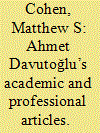

|
|
|
|
|
| Summary/Abstract |
International relations theories have sometimes been criticized as being focused on a narrow set of ideas and values. This article provides a means by which this problem can be addressed by examining the theories of former Turkish Prime Minister Ahmet Davutoğlu, who, prior to joining the government, was an international relations scholar. The article argues that gaining a greater understanding of Davutoğlu’s academic and professional publications is valuable not only to scholars interested in studying Turkey, but also to the study of international relations. Distinguishing him from other thinkers, Davutoğlu’s models are a combination of Islamic values, civilizational theories, and constructivism.
|
|
|
|
|
|
|
|
|
|
|
|
|
|
|
|
| 3 |
ID:
109107
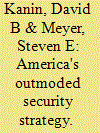

|
|
|
| 4 |
ID:
132143
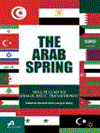

|
|
|
|
|
| Publication |
New York, Palgrave Macmillan, 2012.
|
| Description |
317p.Pbk
|
| Standard Number |
9781137344038
|
|
|
|
|
|
|
|
|
|
|
|
Copies: C:1/I:0,R:0,Q:0
Circulation
| Accession# | Call# | Current Location | Status | Policy | Location |
| 057828 | 320/HEN 057828 | Main | On Shelf | General | |
|
|
|
|
| 5 |
ID:
129869
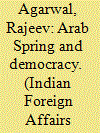

|
|
|
| 6 |
ID:
124946
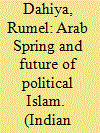

|
|
|
| 7 |
ID:
110117
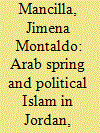

|
|
|
| 8 |
ID:
085191
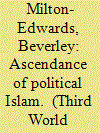

|
|
|
|
|
| Publication |
2008.
|
| Summary/Abstract |
This article outlines the means by which the Palestinian Islamic movement Hamas has developed and implemented a consolidation of power strategy that is inexorably driving it to a state of increasingly authoritarian control in the Gaza Strip. It discusses the factors that have driven Hamas in terms of power seeking as primordial to all radical Islamist movements or as a result of or response to other factors outside its control. The article highlights the concurrent demise of the Fatah organisation in the Gaza Strip as the largest and most visible symbol of secularism. It then reflects on the role of external, including international, actors in accelerating consolidation tactics following the Hamas 'takeover' of power from the Fatah-dominated institutions of the Palestinian Authority (PA) in June 2007. The article aims to demonstrate that Hamas' control in Gaza is an important signpost in terms of developing Islamism in the Middle East region.
|
|
|
|
|
|
|
|
|
|
|
|
|
|
|
|
| 9 |
ID:
146845
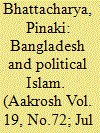

|
|
|
| 10 |
ID:
072354
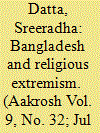

|
|
|
| 11 |
ID:
142940
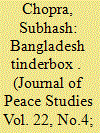

|
|
|
| 12 |
ID:
172447
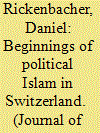

|
|
|
|
|
| Summary/Abstract |
When the Muslim Brotherhood (MB) was banned in Egypt in 1954, many of its followers and leaders found refuge and support in conservative Islamic countries, most notably in Saudi Arabia and Jordan. In the late 1950s, a Saudi diplomat approached the Swiss authorities with plans to open an Islamic Center in Geneva. From the beginning, the Swiss authorities welcomed the project, because it was supported by several pro-Western Arab countries, which opposed Egypt under Nasser. Swiss-Egyptian relations had been strained for some years because of Nasser’s socialist policies and Egypt’s espionage and propaganda operations in Switzerland. The Islamic Center eventually opened in 1960, and was headed by Said Ramadan, an exiled leader of the Muslim Brotherhood. Egyptian officials tried to thwart the Center’s activity and competed with it over influence on the small Arab student body then residing in Switzerland. As a politically active foreigner, the Swiss looked with suspicion on Ramadan. Still, they felt sympathy for his anti-Nasserist and anti-Communist stance, ignoring internal reports revealing the anti-Western and anti-Semitic nature upon his ideology. After 1966, the Swiss Ministry of Foreign Affairs believed Nasser’s Arab nationalism to be in terminal decline, expecting that Islamists might soon come to power in the Middle East. As a result, they decided to allow Ramadan and his family to remain in Switzerland despite overstaying their residence permits. This article sheds light on the founding years of the MB in Europe, a development still largely unchartered by historians, and the reaction of the Swiss to the appearance of a new phenomenon in Europe: political Islam. It argues that the context of Swiss-Egyptian relations is essential for understanding Swiss actions toward the Muslim Brotherhood.
|
|
|
|
|
|
|
|
|
|
|
|
|
|
|
|
| 13 |
ID:
146778
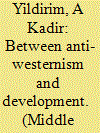

|
|
|
|
|
| Summary/Abstract |
As Turkey's Gezi Park protests reminded us, Islamist parties the world over demonstrate utter disregard of the environment in their discourse and actions. However, Islam as a religion places strong emphasis on environmental protection. Thus, as the representatives of Islam that these parties claim themselves to be, it is puzzling that environmental policy is all but absent from most Islamist platforms. I ask, what explains the poverty of Islamists in regards to the environment? I argue that the reason for this poverty is found within and conforms to political Islam's problematic relationship with modernity, particularly in regards to their strong anti-western sentiment and self-purported victim status. My findings suggest that the inattention Islamists give to the environment is due to their association of environmentalism with the West and because of the uniquely unfavourable socio-economic environments in which they exist, which sends environmentalism to the purview of ‘low politics’. This analysis points to an inherent weakness in Islamist ideology – their lack of pragmatic policy. Hence, the peculiar case of Islamists and the environment is but a symptom of a larger issue within Islamism and can be a key element to understanding why and how Islamism is likely to fail.
|
|
|
|
|
|
|
|
|
|
|
|
|
|
|
|
| 14 |
ID:
110154
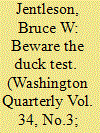

|
|
|
| 15 |
ID:
106019
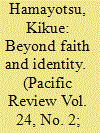

|
|
|
|
|
| Publication |
2011.
|
| Summary/Abstract |
There is a prevailing assumption amongst scholars and observers of Indonesian politics that there is a close link between religious identity and political identity. How valid is this socio-cultural identity model in explaining the party affiliation and political allegiance of increasingly pious Muslim youth to a political organization in the context of democratic consolidation? In particular, how valid is this assumption with consideration to contemporary Indonesian politics? This article engages this debate through a careful analysis of the member recruitment and mobilization of the most successful religious-based Islamist organization in post-authoritarian Indonesia, the Prosperous Justice Party (PKS). The article combines two strands of social movement theory, resource mobilization and opportunity structures, to argue that the PKS's relative success in recruiting committed Muslim youth is explained by two interrelated factors: (1) merit-based cadre recruitment and promotion, which offers young, ambitious and religiously conscious Muslim youth fair and institutionalized political career opportunities and thus incentives to commit themselves to the party's collective interests; and (2) the timing of organizational expansion that coincided with a rapid increase of state office - both executive and legislative - at the sub-national levels as a result of localized democratic elections.
|
|
|
|
|
|
|
|
|
|
|
|
|
|
|
|
| 16 |
ID:
103867
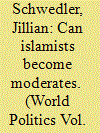

|
|
|
|
|
| Publication |
2011.
|
| Summary/Abstract |
Recent years have seen a surge of studies that examine the inclusion-moderation hypothesis with reference to political Islam: the idea that political groups and individuals may become more moderate as a result of their inclusion in pluralist political processes. Most of these interventions adopt one of three foci: (1) the behavioral moderation of groups; (2) the ideological moderation of groups; and (3) the ideological moderation of individuals. After a discussion of various definitions of moderate and radical, the concept of moderation, and the centrality of moderation to studies of democratization, the author examines the scholarship on political Islam that falls within each approach. She then examines several studies that raise questions about sequencing: how mechanisms linking inclusion and moderation are posited and how other approaches might better explain Islamist moderation. Finally, she offers a critical analysis of the behavior-ideology binary that animates many of these models and suggests some fruitful paths for future research.
|
|
|
|
|
|
|
|
|
|
|
|
|
|
|
|
| 17 |
ID:
082673
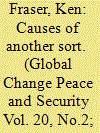

|
|
|
|
|
| Publication |
2008.
|
| Summary/Abstract |
The Islamic caliphate is a key competitor in the global ideological marketplace. Indeed, it has been called 'one possible configuration for a post-industrial politics' (Philip W. Sutton and Stephen Vertigans, 'Islamic "New Social Movements"?: Radical Islam, Al-Qa'ida and Social Movement Theory', Mobilization 11, no. 1(2006): 105). What is its nature? The answer illustrates the argument that the relationship between the informal conception of collective identity and its non-agentive interest in formal establishment is the ontological basis of international relations. This points the way toward resolution of the agent-structure problem with reference to evolutionary theory. Distinguishing between action and behaviour on the basis of subjecthood is useful, showing that actors' primary interest is self-identification through affirmation of an institutional ideal-state. Such ideational objects do not act, but those through which agents successfully constitute and affirm themselves are more likely to prosper strategically. The caliphate is one such. Thus, conceptions of collective identity behave, compete and evolve.
|
|
|
|
|
|
|
|
|
|
|
|
|
|
|
|
| 18 |
ID:
080158
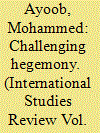

|
|
|
| 19 |
ID:
121071
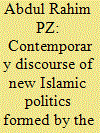

|
|
|
|
|
| Publication |
2013.
|
| Summary/Abstract |
The 2011 popular Arab uprising in West Asia and North Africa has been totally changed the existing perceptions and opinions on the Arabs. Arab uprisings were happened because of the three main deficits. They were economic, political and dignity deficits respectively. Political Islam, Islamist Movements, and new Islamic politics were also discussed rather than before. The political thoughts of classical Islamist Intellectuals like Sayyid Qutub, Hasan al Banna and Abul A'ala Moududi have been modified as per the new Islamic political thoughts of Rashid Al Gannouchi and the practical models of Racep Tayyib Erdogan. Definitions of the Europian secularism and democracy changed.
|
|
|
|
|
|
|
|
|
|
|
|
|
|
|
|
| 20 |
ID:
081052
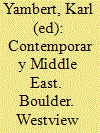

|
|
|
|
|
| Publication |
Boulder, Westview Press, 2006.
|
| Description |
xxviii, 308p.pbk
|
| Standard Number |
9780813343396
|
|
|
|
|
|
|
|
|
|
|
|
Copies: C:1/I:0,R:0,Q:0
Circulation
| Accession# | Call# | Current Location | Status | Policy | Location |
| 053126 | 956.05/YAM 053126 | Main | On Shelf | General | |
|
|
|
|